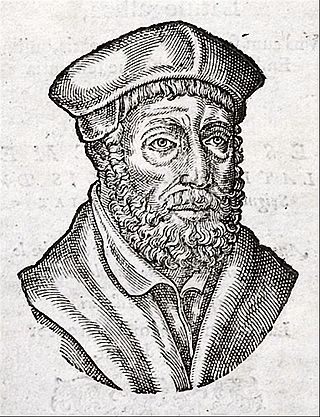
Andrea Alciato, commonly known as Alciati, was an Italian jurist and writer. He is regarded as the founder of the French school of legal humanists.

The Corpus JurisCivilis is the modern name for a collection of fundamental works in jurisprudence, issued from 529 to 534 by order of Byzantine Emperor Justinian I. It is also sometimes referred to metonymically after one of its parts, the Code of Justinian.
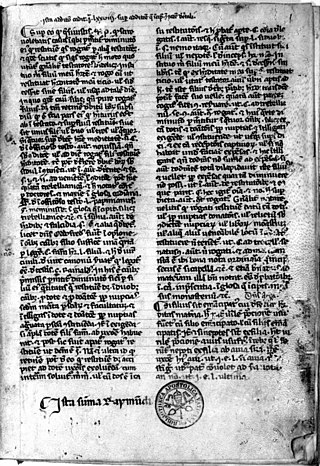
Jacobus Balduinus was an Italian jurist.

Baldus de Ubaldis was an Italian jurist, and a leading figure in Medieval Roman Law and the school of Postglossators.
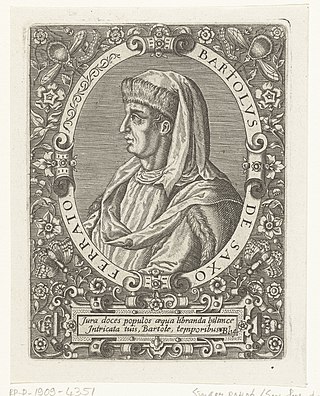
Bartolus de Saxoferrato was an Italian law professor and one of the most prominent continental jurists of Medieval Roman Law. He belonged to the school known as the commentators or postglossators. The admiration of later generations of civil lawyers is shown by the adage nemo bonus íurista nisi bartolista — no one is a good jurist unless he is a Bartolist.

Accursius was an Italian jurist. He is notable for his organization of the glosses, the medieval comments on Justinian's codification of Roman law, the Corpus Juris Civilis. He was not proficient in the classics, but he was called "the Idol of the Jurisconsults".

Irnerius, sometimes referred to as lucerna juris, was an Italian jurist, and founder of the School of Glossators and thus of the tradition of Medieval Roman Law.

Paulus Castrensis was an Italian jurist of the 14th century.

Azo of Bologna or Azzo or Azolenus was an influential Italian jurist and a member of the school of the so-called glossators. Born circa 1150 in Bologna, Azo studied under Joannes Bassianus and became professor of civil law at Bologna. He was a teacher of Franciscus Accursius. He is sometimes known as Azo Soldanus, from his father's surname, and also Azzo Porcius, to distinguish him from later famous Italians named Azzo. He died circa 1230.

The Decretum Gratiani, also known as the Concordia discordantium canonum or Concordantia discordantium canonum or simply as the Decretum, is a collection of canon law compiled and written in the 12th century as a legal textbook by the jurist known as Gratian. It forms the first part of the collection of six legal texts, which together became known as the Corpus Juris Canonici. It was used as the main source of law by canonists of the Roman Catholic Church until the Decretals, promulgated by Pope Gregory IX in 1234, obtained legal force, after which it was the cornerstone of the Corpus Juris Canonici, in force until 1917.

Paul of Venice was a Catholic philosopher, theologian, logician and metaphysician of the Order of Saint Augustine.
Joannes Bassianus was an Italian jurist of the 12th century.

Pietro della Vigna was an Italian jurist and diplomat, who acted as chancellor and secretary (logothete) to Emperor Frederick II. Falsely accused of lèse-majesté, he was imprisoned, blinded and committed suicide soon after. He appears as a character in the Inferno of the Divine Comedy by Dante Alighieri.
Summa and its diminutive summula was a medieval didactics literary genre written in Latin, born during the 12th century, and popularized in 13th century Europe. In its simplest sense, they might be considered texts that 'sum up' knowledge in a field, such as the compendiums of theology, philosophy and canon law. Their function during the Middle Ages was largely as manuals or handbooks of necessary knowledge used by individuals who would not advance their studies any further.
Bernard of Botone was a noted Italian canonist of the thirteenth century. He is generally called Bern(h)ardus Parmensis or Bernard of Parma, from his birthplace Parma.
Bartholomew of Brescia was an Italian canonist.

Girolamo and Pietro Ballerini were Italian Catholic theologians and canonists of the 18th century, brothers, who published joint works.
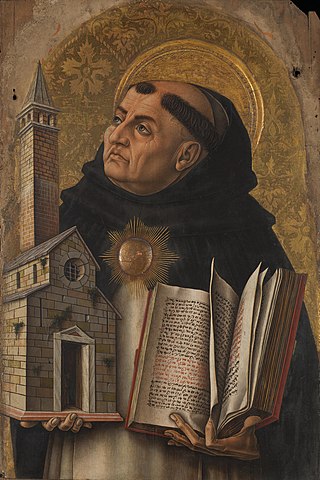
Thomas Aquinas was an Italian Dominican friar and priest, an influential philosopher and theologian, and a jurist in the tradition of scholasticism from the county of Aquino in the Kingdom of Sicily, Italy.
Domenico Maria Ferrabosco was an Italian composer and singer of the Renaissance, and the eldest musician in a large prominent family from Bologna. He spent his career both in Bologna and Rome. His surviving music is all vocal, consisting of madrigals and motets, although he is principally known for his madrigals, which musicologist Alfred Einstein compared favorably to those of his renowned contemporary Cipriano de Rore.
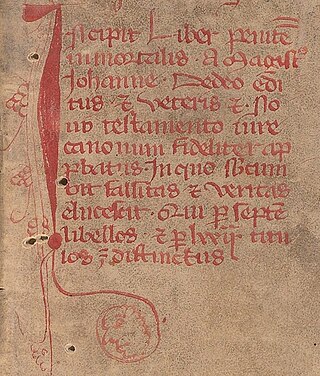
Johannes de Deo was a Portuguese priest, judge and scholar of canon law who taught for over twenty years at the University of Bologna. He was a prolific writer.

















